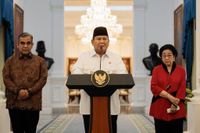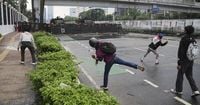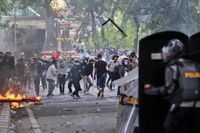In a dramatic turn of events that has gripped Indonesia and drawn international attention, President Prabowo Subianto has pledged to revoke controversial perks for lawmakers, including a generous housing allowance, after a week of escalating protests and violence left at least six people dead and the country’s political elite on the defensive.
It all began on Monday, August 25, 2025, when reports surfaced that all 580 members of Indonesia’s parliament were receiving a monthly housing allowance of 50 million rupiah—about $3,075—in addition to their salaries. According to Associated Press, this allowance, introduced just last year, is nearly ten times the minimum wage in Jakarta. The revelation sparked outrage among ordinary Indonesians, many of whom are struggling with rising living costs, higher taxes, and persistent unemployment.
Public anger quickly boiled over. What started as peaceful demonstrations outside the national Parliament in Jakarta rapidly spread to other cities, morphing into what some protesters called “people’s justice.” Crowds began targeting officials and lawmakers, with addresses of prominent figures circulating online in a wave of doxxing. By Thursday, August 28, tensions reached a tragic peak when 21-year-old ride-hailing driver Affan Kurniawan was reportedly run over by an armored police vehicle during a rally in Jakarta. As reported by The Straits Times, Kurniawan was completing a food delivery order when he was caught in the chaos. “Witnesses told local television that the armored car from the National Police’s Mobile Brigade unit suddenly sped through the crowd of demonstrators and hit Kurniawan, causing him to fall. Instead of stopping, the car ran over him,” the Associated Press recounted.
The incident, captured on video and widely shared on social media, shocked the nation and ignited further unrest. President Subianto announced that seven police officers linked to the incident were being investigated, and the national police later confirmed that these officers had violated the force’s professional code of ethics, placing them under 20 days of special detention beginning August 29.
By Sunday, August 31, the death toll from riots had risen to six. Authorities in Yogyakarta confirmed that Friday’s clashes between demonstrators and riot police had claimed the life of a 21-year-old university student. In Makassar, South Sulawesi, three others died after protesters set fire to the local Parliament building on August 30, turning the structure into a burnt-out shell and a symbol of the unrest.
As the violence escalated, mobs stormed and looted the homes of senior officials, including Finance Minister Sri Mulyani Indrawati. Videos showed protesters smashing property and carrying away valuables—from electronics to luxury handbags. “I was shocked because they forced their way into the housing complex, shouting and causing chaos,” a neighbor, Agung, told the Jakarta Globe. “They took things from the minister’s house. I was afraid they might come into our homes too.”
Other lawmakers were also targeted. National Democratic Party parliamentarian Ahmad Sahroni, known for flaunting his fleet of luxury cars, saw his home invaded, sports cars smashed, and luxury items distributed by the crowd. Two members of the National Mandate Party, television personality Surya Utama (Uya Kuya) and comedian-turned-lawmaker Eko Patrio, faced similar fates after a video of them dancing during a parliamentary session went viral, drawing criticism for being insensitive amid economic hardship. Both issued public apologies on August 30, with Surya saying, “I sincerely apologise from the bottom of my heart to all Indonesians,” and Eko vowing to “be more cautious” and “faithfully uphold my oath as a representative of the people.” All three were suspended by their parties on August 31.
President Subianto, responding to the escalating anger, canceled a high-profile trip to China and summoned 16 religious figures and eight political leaders—including former President Megawati Sukarnoputri, chairwoman of the Indonesian Democratic Party of Struggle—for emergency talks. In a televised address, he appeared flanked by party leaders and announced a rare concession: the controversial housing allowance would be scrapped and overseas work trips for lawmakers suspended under a new moratorium, effective by Monday, September 1.
“I ask all citizens to trust the government, to remain calm. The government that I lead is determined to always fight for the interests of the people, including the smallest, the most left behind,” Subianto said, as quoted by The Straits Times. He emphasized that lawmakers must reflect and “must always be sensitive and always side with the interests of the people.” He also warned that “firm action” would be taken against errant lawmakers by party leaders.
But Subianto’s message was not without stern warnings. He reiterated that while his government respects freedom of expression as guaranteed by the constitution and international conventions, “when demonstrations turn anarchic, destroying public facilities, endangering lives, and attacking private homes or public institutions, this becomes a serious violation of law.” He cautioned that violent acts risk veering into treason and terrorism and warned, “the state would not tolerate attempts to destabilize the country.”
Human rights advocates and political observers have weighed in, acknowledging the legitimacy of public anger while cautioning against lawlessness. Andreas Harsono, a researcher at Human Rights Watch, told The Straits Times, “I support street protests and am disappointed with the behaviour of some MPs, but no one can take the law into their own hands. The authorities must act firmly against looters.” He noted that at least 37 local Parliament buildings had been attacked, some set ablaze, underscoring the depth of public frustration.
The unrest has drawn international concern. The United States, Britain, Singapore, Malaysia, and Australia have all issued travel warnings for Indonesia, urging their citizens to avoid crowds and remain alert in tourist areas. Singapore’s embassy advised nationals to “stay vigilant, monitor developments through the local news and heed instructions by local authorities.” Meanwhile, TikTok suspended its live feature in Indonesia for several days, citing the need to keep the platform “a safe and civil space” during the unrest.
In Jakarta, despite the chaos, life showed signs of resilience. The city’s weekly car-free day went ahead on August 31, with major roads closed to traffic and residents jogging or cycling as city cleaners worked through the night to clear debris from the protests. Yet, the scars of the unrest—charred vehicles, shattered windows, and burnt bus stops—remained visible reminders of a country grappling with deep political and economic tensions.
As Indonesia’s leaders scramble to restore order and regain public trust, the events of the past week have laid bare the fragile relationship between the governed and their representatives. The coming days will test whether President Subianto’s concessions and calls for calm can truly bridge the divide—or whether this moment marks the beginning of a deeper reckoning for the world’s third-largest democracy.



